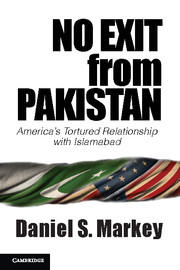6 - From the Outside-In
U.S.-Pakistan Relations in the Regional Context
Published online by Cambridge University Press: 05 June 2014
Summary
The city of Peshawar stands at the door to Pakistan's semi-autonomous tribal lands, the famed Khyber Pass, and Afghanistan. For hundreds of years, it has served as an outpost and garrison, but also as a way station for invading armies, missionaries, and traders of all stripes. Driving along its streets, it is easy to tell Peshawar is close to the Afghan border and the mountains; clusters of women are hidden behind burkas, and in winter men don traditional brown woolen shawls to ward off the chill. All around, three-wheeled Chinese Qingqi scooters mingle with bicycles, donkey carts, cars, and brightly painted trucks and buses.
Peshawar has always felt the reverberations of decisions made in distant capitals. In that respect, the city is much like Pakistan as a whole: seemingly distant, and yet still thoroughly connected to the wider world. In the context of Peshawar's storied history, connections with the United States are short indeed. But remote Peshawar, like the nation of which it is a part, has at times played an outsized role in U.S. policy.
- Type
- Chapter
- Information
- No Exit from PakistanAmerica's Tortured Relationship with Islamabad, pp. 169 - 199Publisher: Cambridge University PressPrint publication year: 2013



